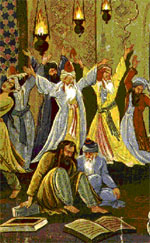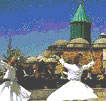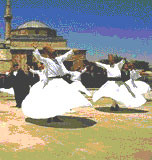

TAKVEEN
JALAL-UD-DIN
RUMI
Salman Khalid, Member KSS Rumi
Cluster Team
|
The man who has inspired hundreds of millions through nine centuries and is considered the greatest of Muslim philosophers and poet-philosophers was born in Balkh, Afghanistan on the fateful day of September 29, 1207 A.D. Rumi's family fled the Mongol invasion and finally settled in Konya, Turkey where he spent most of his life. From an early age Rumi was drawn towards religion and philosophy. Following in his father's ancestral line, he became a scholar until his meeting with the wandering dervish, Shams of Tabriz at the age of 37. That was perhaps the turning point in his life, for Rumi had found the spiritual teacher he was looking for. After Shams, Rumi's other strong influences were Saladin Zarkub, the goldsmith, and later his scribe, Husam. Rumi is credited with being the father of Sufism along with Ibn Al Arabi. He founded the Mevlevi Order of dervishes, better known as the Whirling Dervishes.Through a turning movement, body posturing, mental focus, and sound, the dervish achieves ecstasy through union with God.
Over his lifetime, Maulana Rumi created three poetic and philosophical masterpieces: Divan-e-Shams: A compendium of poetry in praise of
Shams in over 45,000 verses in Farsi (Persian) While many other poets have a mystical vision and then try to express it in a graspable language, Rumi has never attempted to bring his visions to the level of the mundane. He has always expected, rather, demanded the reader to reach higher and higher in his or her own spiritual understanding, and then perhaps be able to appreciate what Rumi was saying. Perhaps this is why there are many layers to his poetry… not so much because of his writing, but because of our understanding. As we transcend in our understanding, we grasp more and more of what he conveyed to us. No wonder Allama Iqbal considered him as his greatest teacher. Mathnavi is perhaps the best-known works of Rumi. He himself defined his work as a work of destruction, destruction of the worldly for the sake of embracing the Divine. He warns the reader in advance to be prepared to let go of everything: Every venture one's life may replete His other great masterpiece is the Divan-e-shams. In Divan-e-shams, he has used many images from the mundane world. Images such as the wine and the wine bearer, the pearl and the ocean, the sun and the moon, the night and day, the caravan, pilgrimage and many more.The mastery of rhyme and rhythm is such that he often creates a new vocabulary, using the same old words, yet creating new feelings that are associated with them. One cannot help but marvel at the linguistic mastery he displays. In any case, the end result is the same … the experience of artistic beauty, musical genius, rhythm and ecstatic energy, all in conjunction with the mental understanding of the wisdom conveyed. In other words, His presence pervades his poetry, and one cannot help but be touched by such powerful and loving presence. The morning wind spreads its fresh
smell The sad thing
is that this philosopher cum mystic giant who was also a religious scholar
par excellence was branded as a heretic in his own lifetime and religious
orthodoxy till date considers him such. Perhaps the reason being that Rumi
attacked the reduction of religion down to a mere ritual and not trying to
absorb the love of God in mind as well as in spirit. Rumi died at sunset of December 16, 1273 A.D at the age of 66 yet his message lives on nine centuries after he died. In the intolerant world of today, the message of Rumi becomes all the more relevant. His message of love, peace and his depth of understanding shall always be a guiding force for millions. Dance, when you're broken
open. | |||||||||




